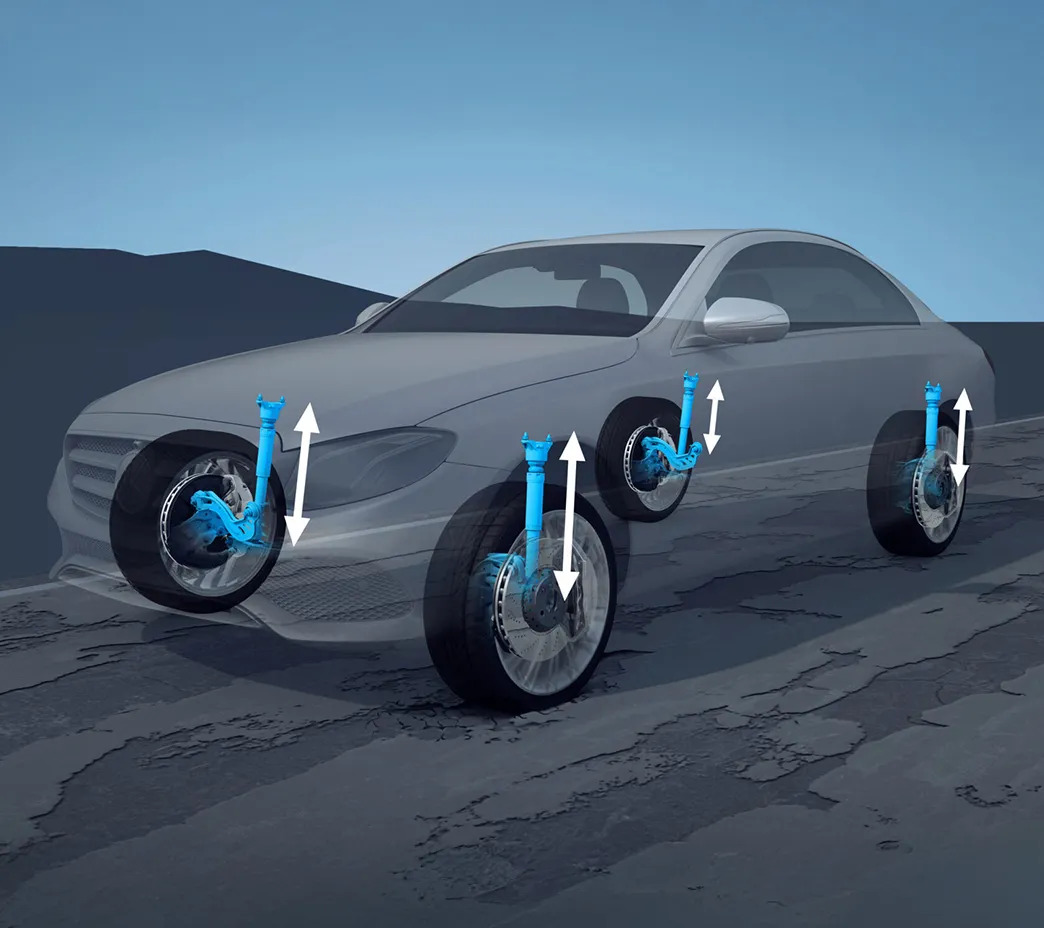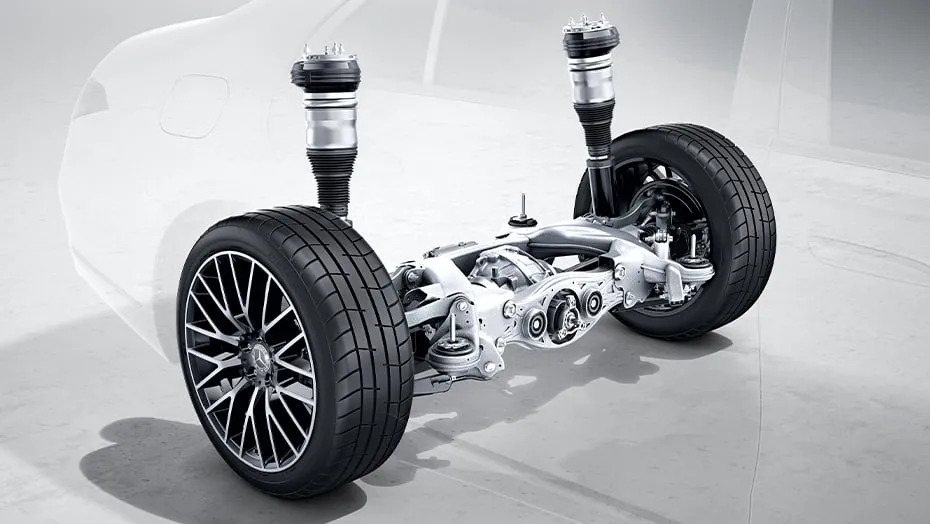Your Mercedes-Benz is engineered to deliver an exceptional driving experience on every journey, whether you’re cruising along Atlantic Avenue or heading out to I-95 for a weekend getaway. At the heart of that refined, cloud-like ride is the AIRMATIC suspension system—a sophisticated blend of air springs, electronic controls, and adaptive damping that continuously adjusts to road conditions. But here’s what most owners don’t realize until it’s too late: Florida’s intense heat and humidity are constantly working against this precision system, accelerating wear in ways that simply don’t happen in cooler, drier climates. When components begin to fail, your ride quality suffers, handling becomes unpredictable, and your vehicle’s safety systems can be compromised. That’s why professional maintenance from our certified Mercedes-Benz technicians isn’t just recommended—it’s absolutely essential for protecting your investment and ensuring every drive feels exactly the way Mercedes-Benz intended.
What is Mercedes-Benz AIRMATIC Suspension?
AIRMATIC suspension represents Mercedes-Benz’s advanced air suspension technology, a system that replaces traditional coil springs with air springs at each wheel. These air springs are filled and adjusted by an onboard compressor, constantly adapting the vehicle’s ride height and damping characteristics based on driving conditions, load, and selected drive mode. The result is remarkably smooth, controlled handling that automatically compensates for road imperfections, heavy cargo, or spirited driving through Ormond Beach’s winding roads. Unlike conventional steel springs that provide a fixed response, AIRMATIC continuously monitors vehicle dynamics through multiple sensors, making real-time adjustments hundreds of times per second to maintain optimal comfort and stability.
The system is standard on many premium Mercedes-Benz models, including the S-Class, GLE, and GLS, where it works in harmony with sophisticated electronics to deliver that signature Mercedes ride quality. It also offers practical benefits like load-leveling—automatically raising the rear suspension when you’re hauling luggage or towing—and the ability to lower the vehicle for easier entry and exit. This technology is precisely why your Mercedes feels so different from other vehicles, but it also means repairs require specialized knowledge that general mechanics simply don’t possess.
The “Florida Factor”: How Heat and Humidity Affect Your AIRMATIC System
Living in Daytona Beach means enjoying year-round sunshine and coastal breezes, but it also means your Mercedes-Benz faces environmental challenges that significantly impact AIRMATIC longevity. Florida’s average summer temperatures regularly exceed 90°F, with humidity levels routinely above 70%—conditions that accelerate the deterioration of rubber air springs and seals throughout the suspension system. The rubber compounds in air springs are designed to flex millions of times, but when constantly exposed to intense heat, they dry out and crack far more quickly than they would in temperate climates. You’ll often see this manifest as small cracks along the air spring bellows, which eventually lead to air leaks and that telltale sagging on one corner of your vehicle.
Humidity creates its own set of problems, particularly for the air compressor and valve block that control pressure distribution. Moisture naturally enters the system through normal operation, and in Florida’s humid environment, this moisture accumulates much faster. When that moisture mixes with the compressor’s internal components, it promotes corrosion and can freeze expansion valves, causing the system to malfunction unexpectedly. Salt air from the nearby Atlantic Ocean compounds these issues, particularly if you frequently drive along A1A or park near the beach. These aren’t theoretical concerns—schedule your AIRMATIC inspection and you’ll frequently find that Florida-driven vehicles often show accelerated wear patterns compared to the same models driven in northern states, making proactive maintenance absolutely critical for avoiding expensive emergency repairs.
5 Signs Your AIRMATIC Suspension Needs Service
Your Mercedes-Benz is constantly communicating with you through subtle changes in performance and behavior. Learning to recognize these early warning signs can save you from being stranded and prevent minor issues from escalating into major system failures. Here are the five most common indicators that your AIRMATIC suspension requires professional attention:
- Dashboard Warning Messages: The most obvious sign is an “AIRMATIC Malfunction” warning on your instrument cluster. This message appears when the system’s self-diagnostic function detects a fault—anything from a failing air spring to a compressor issue. Never ignore this alert; continuing to drive can damage additional components and potentially compromise vehicle stability, especially during emergency maneuvers on I-95.
- Vehicle Sits Lower on One or More Corners: If you notice your Mercedes sitting noticeably lower on one side after being parked overnight, you almost certainly have an air leak in that corner’s air spring. This is especially common in Florida, where heat-damaged rubber develops small cracks that slowly release air. While the compressor might pump the vehicle back up temporarily after starting, the leak will worsen over time, eventually overwhelming the compressor and causing it to fail from overwork.
- Compressor Runs Constantly or Makes Unusual Noises: The AIRMATIC compressor should operate quietly and only when needed. If you hear continuous running, grinding, or whining sounds coming from beneath the vehicle, the compressor is struggling to maintain system pressure, usually because of an air leak elsewhere. This constant operation burns out the compressor motor prematurely and drains your battery.
- Rough or Bouncy Ride Quality: One of AIRMATIC’s primary benefits is exceptional ride comfort. If you suddenly notice your Mercedes feels harsher over bumps, bounces excessively after dips in the road, or exhibits a wallowing sensation during turns along Seabreeze Boulevard, the system isn’t properly damping wheel movement. What you’re experiencing is essentially a luxury vehicle performing like a much lesser car—definitely not what you paid for.
- Extended Rise Time When Starting: When you start your Mercedes, AIRMATIC should lift the vehicle to proper ride height within about 30-45 seconds. If it takes noticeably longer, makes multiple attempts, or fails to reach full height entirely, the system is struggling. This extended rise time indicates either compressor weakness, significant air leaks requiring extra pump cycles to compensate, or failing valves that can’t properly hold pressure.
If you’re experiencing any of these symptoms, don’t wait for a complete system failure. The longer you drive with AIRMATIC issues, the more damage occurs to related components. What might start as a single air spring replacement can quickly escalate to include the compressor, valve block, and air lines if neglected.
Why Choose Certified Technicians for AIRMATIC Maintenance
AIRMATIC suspension isn’t something you trust to just any shop, and there are very good reasons why. This system integrates deeply with your Mercedes-Benz’s electronic architecture, communicating with everything from the ABS system to the adaptive drive mode controls. Diagnosing issues requires Mercedes-Benz proprietary diagnostic software and specialized equipment that generic code readers simply cannot access. When you bring your vehicle to a shop without this technology, they’re essentially guessing based on symptoms rather than reading the actual fault codes stored in your vehicle’s multiple control modules. This often leads to replacing parts that aren’t actually faulty while missing the true problem, costing you significantly more money and leaving issues unresolved.
Our certified technicians receive ongoing training directly from Mercedes-Benz, staying current with the latest diagnostic procedures and technical service bulletins specifically addressing AIRMATIC systems. They understand how Florida’s climate affects different model years differently—for instance, pre-2012 systems with different air spring designs versus the updated components in newer models. We also exclusively use Genuine Mercedes-Benz Parts, which are specifically engineered for your vehicle’s weight, performance characteristics, and expected operating environment, including extreme heat. Aftermarket alternatives might look similar and cost less initially, but they frequently fail prematurely in Florida’s harsh conditions, leading to repeat repairs and additional expenses that quickly exceed any initial savings.
Beyond technical capability, there’s the question of warranty and accountability. When you choose our service center, every repair is backed by Mercedes-Benz warranties on both parts and labor, giving you complete confidence in the work performed. We maintain detailed service records in your vehicle’s electronic history, which proves invaluable for warranty claims, future diagnostics, and maintaining resale value. Plus, our technicians work on AIRMATIC systems daily, giving them hands-on experience with failure patterns specific to Daytona Beach’s environment—knowledge that translates directly into faster, more accurate repairs that get you back on the road safely.
Maintaining Peak Performance in New Models (S-Class, GLE, GLS)
If you’re driving one of Mercedes-Benz’s flagship models—the sophisticated new Mercedes-Benz S-Class, the versatile GLE, or the commanding GLS—you’re experiencing AIRMATIC technology at its absolute finest. These vehicles feature the most advanced iterations of air suspension, with enhanced sensors, faster response times, and integration with Mercedes-Benz’s innovative E-ACTIVE BODY CONTROL system in some variants. The S-Class, for example, uses road-scanning cameras to read upcoming surface irregularities and pre-adjust suspension settings before you even reach them, delivering an almost supernatural ability to glide over imperfect pavement.
For newer models, preventive maintenance becomes even more critical because of the increased system complexity. While older AIRMATIC systems primarily focused on ride height control and basic damping, current systems actively manage body roll during cornering, adjust ride height automatically for highway efficiency, and can even raise one side of the vehicle to help protect occupants in detected side-impact scenarios. When components begin to degrade—even slightly—these advanced functions can’t operate as designed, noticeably diminishing the driving experience you invested in. We recommend AIRMATIC system inspections every 10,000-15,000 miles or annually for Daytona Beach-area owners. If you explore new models like the GLE and GLS, understand that maintaining these advanced systems isn’t optional—it’s an essential part of luxury vehicle ownership that protects both your driving experience and your significant investment.
Common AIRMATIC Issues and Their Solutions
| Symptom | Common Cause | Professional Solution | Why DIY Fails |
|---|---|---|---|
| Vehicle sagging overnight | Cracked air spring bellows | Replace affected air spring with Genuine Mercedes part | Cannot diagnose which corner without testing equipment |
| AIRMATIC warning light | Compressor relay failure or air spring leak | Mercedes diagnostic scan to pinpoint exact fault code | Generic scanners cannot read Mercedes-specific codes |
| Compressor runs constantly | System air leak (springs, lines, or valve block) | Systematic leak detection and component replacement | Leaks often in multiple locations simultaneously |
| Uneven ride height | Failed level sensor or valve block malfunction | Calibrate sensors, replace valve block if needed | Requires Mercedes STAR diagnostic system for calibration |
| Harsh ride quality | Damper failure or insufficient air pressure | Test dampers individually and replace failed components | Cannot distinguish between damper and spring issues |
Note: AIRMATIC repairs should only be performed by certified technicians using proper diagnostic equipment and Genuine Mercedes-Benz components.
AIRMATIC Suspension Service FAQs
Q: What are the most common signs of AIRMATIC suspension failure?
A: The most frequent indicators include your vehicle sitting noticeably lower on one or more corners (especially after sitting overnight), an “AIRMATIC Malfunction” warning on your dashboard, a compressor that runs constantly or makes grinding noises, rough ride quality over bumps you normally wouldn’t feel, and extended time for the vehicle to rise to proper ride height when starting. Any of these symptoms means you should schedule a diagnostic inspection immediately to prevent further damage.
Q: Can I drive my Mercedes-Benz with an “AIRMATIC Malfunction” warning?
A: While your vehicle might still be drivable with this warning, we strongly recommend against it except to reach our service center directly. The warning indicates the system has detected a fault that could worsen with continued driving. In some cases, the suspension may drop to minimum ride height to protect components, affecting ground clearance and potentially causing damage to undercarriage components. More importantly, compromised suspension affects vehicle stability and braking, creating genuine safety concerns.
Q: Is AIRMATIC suspension expensive to repair?
A: AIRMATIC repairs vary considerably depending on which components are affected. A single air spring replacement is significantly different from replacing a compressor or valve block. What we can tell you is that early intervention almost always costs less than waiting for complete system failure. When one component fails and you continue driving, it places additional stress on other parts, turning a single repair into multiple repairs. Regular inspections help catch issues early when they’re most affordable to address.
Q: How often should my AIRMATIC suspension be inspected?
A: For Daytona Beach area vehicles, we recommend AIRMATIC inspections every 15,000 miles or annually, whichever comes first. Florida’s heat and humidity accelerate component wear compared to cooler climates, making preventive inspections even more valuable. These inspections are quick, non-invasive, and can identify developing issues before they leave you stranded or cause secondary damage to related components.
Q: Why is my Mercedes-Benz sitting lower on one side?
A: When your vehicle sits lower on one corner, you almost certainly have an air leak in that corner’s air spring. Heat-related cracking of the rubber bellows is the most common cause in Florida. The leak allows air to escape slowly when the vehicle is off, causing that corner to drop. While the compressor might temporarily restore proper height after starting, the leak progressively worsens, eventually overwhelming the compressor and causing it to fail from constant operation.
Q: Does Florida’s hot weather really damage my suspension?
A: Absolutely. The rubber air springs in your AIRMATIC system are engineered to flex millions of times, but constant exposure to temperatures above 90°F accelerates rubber degradation significantly. The rubber becomes brittle and cracks far earlier than it would in moderate climates. Similarly, heat affects the compressor by increasing operating temperatures beyond optimal ranges, while humidity promotes internal corrosion.
Schedule Your AIRMATIC Suspension Service Today
Don’t let a failing AIRMATIC system compromise your Mercedes-Benz’s legendary ride quality and safety on Daytona Beach’s roads. The factory-trained experts at Mercedes-Benz of Daytona Beach Service Center are here to restore that cloud-like comfort and precision handling, whether you drive a brand-new S-Class or a trusted GLE that’s been serving you reliably for years. We have the right diagnostic tools, Genuine Mercedes-Benz parts, and specialized knowledge to handle any AIRMATIC issue efficiently and effectively.
With Daytona’s year-round heat and humidity constantly challenging your suspension components, waiting to address AIRMATIC problems only makes the situation worse and potentially more expensive to fix. Our comprehensive diagnostic approach identifies exactly what your system needs, ensuring you get appropriate service that solves the problem rather than just temporary fixes that fail when you’re navigating I-95 or cruising along A1A.
Or visit us at 1030 Volusia Avenue, Daytona Beach, FL 32114, and let our certified technicians ensure your suspension keeps delivering that signature Mercedes-Benz comfort and confidence on every journey.





